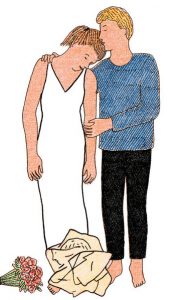
Many of the young couples who come to see me are terrified at the 50% divorce statistic and are seeking the answer to avoiding it. The best answer is, of course, to marry the right person. The question arises repeatedly: Why do so many of us make mistakes?
Swiss-born, British-based philosopher and award-winning television personality Alain de Botton writes and presents on contemporary themes, among them the process of falling in and out of love. The following piece is an excerpt from a recent NYTimes article in which De Botton attempts to explain why so many of us marry the wrong person.
* * *
One of the privileges of being on our own is the sincere impression that we are really quite easy to live with. Our partners are no more self-aware. Naturally, we make a stab at trying to understand them. We visit their families. We look at their photos, we meet their college friends. All this contributes to a sense that we’ve done our homework. We haven’t.
Marriage ends up as a hopeful, generous, infinitely kind gamble taken by two people who don’t know yet who they are or who the other might be, binding themselves to a future they cannot conceive of and have carefully avoided investigating.
For most of recorded history, people married for logical sorts of reasons: because her parcel of land adjoined yours, his family had a flourishing business, her father was the magistrate in town, there was a castle to keep up, or both sets of parents subscribed to the same interpretation of a holy text. And from such reasonable marriages, there flowed loneliness, infidelity, abuse, hardness of heart and screams heard through the nursery doors….
1. Recklessness is often taken as a counterweight to all the errors of reason, that catalyst of misery, that accountant’s demand. What matters in the [contemporary] marriage of feeling is that two people are drawn to each other by an overwhelming instinct and know in their hearts that it is right. The prestige of instinct is the traumatized reaction against too many centuries of unreasonable reason.
2. We marry the wrong people because we don’t associate being loved with feeling happy. Though we believe ourselves to be seeking happiness in marriage, it isn’t that simple. What we really seek is familiarity — which may well complicate any plans we might have had for happiness…. The love most of us will have tasted early on was often confused with other, more destructive dynamics: feelings of wanting to help an adult who was out of control, of being deprived of a parent’s warmth or scared of his anger, of not feeling secure enough to communicate our wishes.
How logical, then, that we should as grown-ups find ourselves rejecting certain candidates for marriage not because they are wrong but because they are too right — too balanced, mature, understanding and reliable — given that in our hearts, such rightness feels foreign.
3. We make mistakes, too, because we are so lonely. No one can be in an optimal frame of mind to choose a partner when remaining single feels unbearable. We have to be wholly at peace with the prospect of many years of solitude in order to be appropriately picky; otherwise, we risk loving no longer being single rather more than we love the partner who spared us that fate.
4. Finally, we marry to make a nice feeling permanent. We imagine that marriage will help us to bottle the joy we felt when the thought of proposing first came to us: Perhaps we were in Venice, on the lagoon, in a motorboat, with the evening sun throwing glitter across the sea, chatting about aspects of our souls no one ever seemed to have grasped before, with the prospect of dinner in a risotto place a little later. We married to make such sensations permanent but failed to see that there was no solid connection between these feelings and the institution of marriage.
Indeed, marriage tends decisively to move us onto another, very different and more administrative plane, which perhaps unfolds in a suburban house, with a long commute and maddening children who kill the passion from which they emerged.
The person who is best suited to us [in that very different plane] is not the person who shares our every taste (he or she doesn’t exist), but the person who can negotiate differences in taste intelligently — the person who is good at disagreement. Rather than some notional idea of perfect complementarity, it is the capacity to tolerate differences with generosity that is the true marker of the “not overly wrong” person.
Compatibility is an achievement of love; it must not be its precondition.